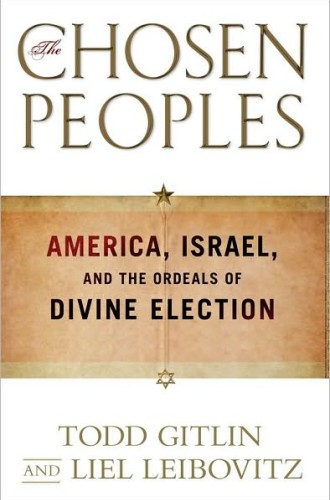The Chosen Peoples, by Todd Gitlin and Liel Leibovitz
Todd Gitlin of Columbia University and Liel Leibovitz of New York University have written a thoughtful critical volume on the roots and costs of chosenness as it pertains to historical and contemporary Israel and the United States. Their approach is nonpolemical, but their tone implies an important critique of the ideology of chosenness, a summons to do better (that is, repent) and a recognition that supposed chosenness is as much an ordeal as it is a gift. The authors are fully aware of the prerational force of entitlement and privilege that is exercised in the ideology of chosenness.
As a former noncommissioned officer in the Israel Defense Forces, Leibovitz comes at the question of Israel's chosenness from the inside. Gitlin's social location is not indicated, but perhaps his work also reflects a Jewish sensibility. In any case, the authors trace the trajectory of Israel's chosenness from the claims of the Bible to contemporary practice.
Read our latest issue or browse back issues.
The authors recognize that chosenness from the beginning, with Abraham, is an odd claim that "invites incomprehension, skepticism, and obstreperousness" on the part of the chosen, even founding father Abraham himself. In the face of rational wonderment about being chosen, they allow that faith "renders questions of the literal truth of the scriptural stories unnecessary, even petty." But when it comes to the immensity of God and God's intent, faith will not "be obstructed by observed facts."
The defining connection made in the tradition is that the chosen people are linked to chosen land. It is this connection of people and land that produced the messianic impulse of Judaism that is obscured and decentered by traditional rabbinic Judaism. This connection runs from the Bible to the Hasidim, who struggled to recover and restore Judaism. Given the severe pressure for assimilation in Enlightenment Europe, Zionism "erupted from Europe's soil," a reaction that embraced all the components that constituted Jewishness: chosenness, promise and land. It was singularly Rabbi Abraham Isaac Kook who delivered the impulses of Zionism in the 20th century with his insistence that God and Israel are "eternally unconditionally bound." His work was taken up by his son Rabbi Zvi Yehuda Kook, who died in 1982.
It is well known that the roots of Zionism that led to the state of Israel were largely secular. But the messianic brand of chosenness is what has shaped Israeli politics and has produced the zeal for current political determination and defiance. Its result is that "settler certitude outfoxes and outlasts secular uncertainty." The outcome is a "utopian design" held and fostered by the settlers, who believe that any compromise on the land is a compromise of what is most precious and defining.
For all the secular claims of David Ben-Gurion and his trajectory of political leadership, it is messianic Zionism, with its uncompromising position on the chosenness of people and land, that dominates politics and provides the standing ground for the leadership of Prime Minister Benjamin Netanyahu. Many secular politicians have opposed and will continue to oppose such an impulse, but they cannot withstand or defy its force. Gitlin and Leibovitz speak of the "ordeal," the "burden" and the "affliction" of chosenness, but the current "territorial mania" has no patience with such an awareness.
Turning to U.S. chosenness, the authors find a note of theological exceptionalism in the words of some of the first Europeans to come to the America—John Winthrop, John Cotton and the Puritans, who trafficked in evangelical rhetoric that would fuel revolutionary fervor. What strikes one most about this analysis is the way in which U.S. chosenness, like Israel's, is linked to the land. Jefferson, Jackson and Polk, the great expansionists, all appealed to chosenness as a basis for national imagination. Even Jefferson, in his cool deism, found such rhetoric useful for mobilizing energy for his expansionist impulse.
The authors suggest a straight line of influence from the Puritans to the aggressiveness of Theodore Roosevelt, the missionary zeal of Woodrow Wilson and eventually the eager reach of George W. Bush, all of which attached American greatness to a grasp for more land under the guise of advancing democracy. This propensity has had from the outset a conscious component of Manifest Destiny, and it has culminated in a U.S. imperialism that is shaped by racism, in which the white race is destined to govern for and on behalf of the less competent of other races. This material is not unlike that presented by Bruce Feiler in America's Prophet: Moses and the American Story, only here the aggressiveness is more accented and the authors imply a critique of uncritical chosenness.
This nearly Manichaean sense of chosenness has been interrupted in U.S. history only rarely, by such voices as William Jennings Bryan, William James and Mark Twain. It was especially called into question by the ironic sense of Abraham Lincoln, here singled out for his phrase "almost chosen people." Lincoln would not give in to the ideology of chosenness. As the authors draw a line from Teddy Roosevelt to George W. Bush, they dare to entertain also the possibility of a line that runs from Lincoln to Barack Obama, a line that is promised but surely not very visible or reliable. In sum, the messianic claim to the land is as deeply embedded in the ideology of the United States as it is in the passion of Israel.
Finally, in a nearly meditative tone, the authors ponder the unchosen and consider the deep tension between "the West" (with the U.S. as a stand-in) and Muslims. They present the Israeli-Palestinian contestation over the land as a contest between humiliation and vengeance, with the humiliators never understanding that they evoke the vengeance.
The conflict between the chosen and the unchosen is, of course, ongoing:
The drama of a single chosen people colliding with pretenders and unsalvageables haunts the story of bloody encounters from the Crusades to the Arab Revolt of 1936-39, from Little Big Horn to the Yom Kippur War, from Wounded Knee to Hebron. . . . The chosen and the unchosen are entangled together by resentment and resignation, mercy and anger, humor and heartbreak, cacophony and harmony. The relationship between the chosen people and those whom they dispossess . . . is partly an extended war dance, but it is also a sequence of movements, sometimes slow, sometimes stormy, in which the vanquished, while never triumphant, nonetheless help determine the rhythm of history.
The authors consider the views of Frantz Fanon and Edward Said to be voices of the unchosen. They indicate the ways in which chosenness moves against the unchosen and begets a counter-chosenness, so that there is an endless contest of chosennesses that is a toxic game without exit, that falls into a mad mode of Manichaeanism.
This descriptive analysis results in no stunning insights, but does yield a hope and an urging that the chosen might act differently with and toward the unchosen. Gitlin and Leibovitz briefly point to the Palestinian poetry of Mahmoud Darwish, who imagines a renunciation of a divine scripted calling, a suggestion that is paralleled by the hope of the Jewish writer Mark Braverman. But the tone of the book by its end is a sad realism that "the cycles of race hatred, revenge, and war cannot be rescinded, erased from memory. History is unsparing." That is as far as the book goes. It is an honest rendition of where we are.
A third element of the enigma of chosenness lies beyond the horizon of these authors but surely belongs in our consideration, for one cannot get from the chosenness of Israel to the chosenness of the United States except by way of the chosenness of the church. It is certain that the church regards itself as the most recently chosen people of God—chosen for mission, but chosen nonetheless. And that chosenness has produced claims of "no salvation outside the church," with all the power and leverage that such a claim has historically carried.
Thus as we reconsider chosenness, I suggest that the church cannot get a pass on the problem. And if the church cannot, then there may be reconsiderations about the claim for the chosenness of Jesus as the sole Messiah—a claim that is deep within our Christian confession, which I gladly confess, but one that is exceedingly difficult for many faithful people in a world of good-faith neighbors. We do not know our way forward on such profound challenges, even as we do not know how the chosenness of Israel or the United States can be revisioned in a world that cries out for justice and peace.
At the very edge of the Hebrew Bible is this astonishing oracle of promise in Isaiah: "On that day Israel will be the third with Egypt and Assyria, . . . whom the Lord of hosts has blessed, saying, 'Blessed be Egypt my people, and Assyria the work of my hands, and Israel my heritage'" (Isa. 19:24–25). The oracle dares to list God's pet names for chosen Israel and then freely distribute them across the landscape, even to Israel's enemies. The message of such poetic imagination is that God has many chosen peoples. It is to be "on that day." We may now wonder, when these several chosennesses have reached their lethal limit, how soon that day may be. It is a day that requires relinquishments of a daring, obedient kind.






